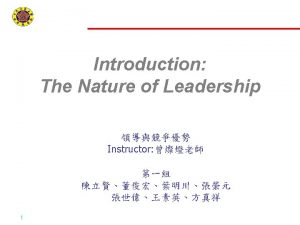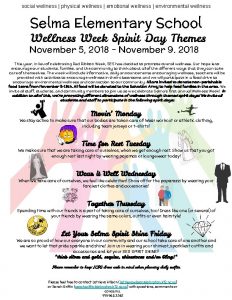Leadership as a Wellness Practice Jessica H Stoddard













- Slides: 13

Leadership as a Wellness Practice Jessica H Stoddard, D 4 G & Wellness Director, AIGA CIN

Full Disclosure: I am not an expert Unless you count making mistakes as expertise.

There are 12 key behaviors that help maintain mental health These 12 have been repeatedly identified by studies in psychology, neurology, and sociology as necessary for mental and physical health. None of them should be surprises.

There are 12 key behaviors that help maintain mental health Some behaviors are easier to define than others, though.

There are 12 key behaviors that help maintain mental health Some behaviors are easier to define than others, though. Getting Outside Getting enough sleep 10 minutes a day (averaged) for vitamin D production. It’s 7 -8 hours (average) nightly. Poor sleep hygiene is like smoking: you’re healthy until you’re not. eating a balanced diet staying hydrated Exercising Limiting alcohol / caffeine 1, 600 - 3, 000 calories a day depending on activity, age, and gender. 40/30/30 carbs/fats/proteins is balanced. 5 oz - 1 oz of water for each pound you weigh, daily. 2. 5 hours of moderate activity weekly 5 brisk walks or 1. 5 hours of vigorous activity are key to stimulating dopamine production Both HIDE stress symptoms instead of helping you deal with stress #sorrynotsorry. Plus they dehydrate you, and more than 4 alcoholic drinks a day or 14 a week for men or 3 drinks a day or 8 a week for women is considered high risk drinking.

There are 12 key behaviors that help maintain mental health The harder to define behaviors are actually key to becoming a better leader, as well as satisfaction from your leadership roles. Leadership as a Wellness Practice

We’re all born storytellers Journaling Focusing on your strengths and those of your team require you to take note. Simply asking yourself what you can be greatful for, and acknowledging what has been accomplished helps you focus on the good things in your life. It can also help you let go of stress privately, so you don’t end up saying something regrettable or acting inappropriately in public. Extending this to your AIGA team and coworkers can have profound results.

Cultivating a Positive Attitude It’s not an attitude of gratitude, it’s a practice of gratitude. Taking what your grateful for in private and making it public is a solid way to create shared purpose as a leadership practice. Making other people feel good actually stimulates dopamine production in your own brain. Taking time to show appreciation helps motivate your team to “be caught doing good” instead of avoiding punishment for not measuring up.

Building community means Asking for Help Leading a community is more than simply offering help / making other people feel good / solving other people’s problems. Asking for help means exploring your own imperfection, but admitting shortcomings helps us understand what “shared humanity” actually means and can lead to judging ourselves less. By asking for help we show people that we trust them, and it lets them trust us when they need help as well - which leads to a more productive team.

Giving Feedback The “upside-down” side of reflecting daily, and taking an honest assessment of ourselves and our team’s shortcomings, is that it sometimes leads to difficult conversations. It’s important to understand that we can’t lead people to be their best without having those difficult conversations; but being clear and kind is the best way to approach them. Clear means not avoiding the subject. Kind means extending the most generous possible interpretation of a subject and seeking to understand before trying to convince someone else to change.

Mindfulness just means Paying Attention Leadership requires facing difficult situations, but modeling leadership behavior means staying calm under pressure. Mindfulness isn’t just for Yoga, etc, it’s about being aware of our surroundings. The army actually calls it “Tactical” or “Box” Breathing. It can be using your imagination, or doodled in a notebook, and you just repeat as needed. If you feel yourself losing control of your emotions or focus - breathe in while you draw a line to the right, hold your breath draw a line down, out for the line to the left, and hold again while you draw a line up.

Scheduling Downtime As creatives, we’re always excited by the next project, and it can be tempting to ask our teams to work constantly in order to achieve as much as possible. Modelling rest, play, and recover is as important to success as the hard work that makes them necessary. Is the story you’re telling a worthwhile one? We build trust in the small moments, and scheduling play time for the team, along with gratitude based time for rest and relaxation, gives our team a chance to grow together, more connected and ready for the next challenge.

Thank You ● Further Reading & Inspiration ● Physical Health Standards & Research ● 12 Tips for Maintaining Mental Health Jessica H Stoddard, D 4 G & Wellness Director, AIGA CIN
 Aldo leopold and theodore roosevelt
Aldo leopold and theodore roosevelt Teddy stoddard story
Teddy stoddard story Hyde as a frightening outsider
Hyde as a frightening outsider Brandy heckman-stoddard
Brandy heckman-stoddard Transformational leader and transactional leader
Transformational leader and transactional leader Adaptive leadership vs situational leadership
Adaptive leadership vs situational leadership Adaptive leadership vs situational leadership
Adaptive leadership vs situational leadership Leadership theory and practice 6th edition
Leadership theory and practice 6th edition Authentic leadership theory and practice
Authentic leadership theory and practice Servant leadership northouse
Servant leadership northouse The practice of adaptive leadership summary
The practice of adaptive leadership summary The practice of adaptive leadership summary
The practice of adaptive leadership summary Practice assessor and practice supervisor
Practice assessor and practice supervisor Windward wellness
Windward wellness

























